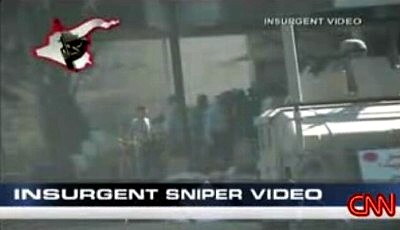Maliki, U.S., Britain to meet with Sunni insurgent representatives next week
 The Islamic Army of Iraq, which released a video in October of sniper shootings of U.S. troops, will be among those represented at the talks
The Islamic Army of Iraq, which released a video in October of sniper shootings of U.S. troops, will be among those represented at the talksThe Prime Minister of Iraq will sit down for the first time next week with representatives of insurgent groups in his most concerted effort yet to quell the country’s sectarian war.
Nouri al-Maliki’s Government has asked insurgent leaders to send intermediaries to a national reconciliation conference, marking a new domestic drive to bring peace to Iraq.
It will pave the way for a subsequent conference outside Iraq, possibly in Damascus or Amman, with insurgent leaders themselves.
The one-day conference, which will be held on November 28 or 29, was disclosed to The Times by Akram al-Hakim, the National Dialogue and Reconciliation Minister.
The peace initiative comes as the United Nations released a report yesterday into human rights, which said that 7,054 civilians had been killed in September and October, making it Iraq’s deadliest period since 2003.
Such tidings have made Mr al-Hakim determined to host the conference next week, despite it having already been postponed twice — the first time by the Government and the second time by the Iraqi opposition. Mr al-Maliki will attend the conference with other prominent officials and MPs. Diplomats from Britain and the US, as well as coalition military officers, have also been invited.
The summit will not include outside terrorist groups such as al-Qaeda. It will address the question of Shia militias, but controversial groups such as Al-Mahdi Army will not be included — because the Shia-led Government believes that it can deal with them within its own communities.
The conference is the culmination of months of work in which Iraqi Government delegations have toured Arab capitals, including Cairo, Dubai and Amman. Mr al-Hakim said that they had met former members of Saddam Hussein’s regime and people who were either directly or indirectly connected to the resistance.
These Baathist factions and other insurgent groups will likely send intermediaries to the Baghdad conference and wait to send actual members to the next reconciliation conference, which could be held in late December or January.
However, both the Cabinet and parliament will have to give formal approval for insurgents and Baathists to participate in this next crucial meeting.
Mr al-Hakim emphasised that the Baathists, with whom discussions were taking place abroad, were not implicated directly in any of Saddam Hussein’s crimes.
“We aren’t talking about previous regime members that are actively wanted and have committed atrocities,” he said. Those to whom they have spoken included ministers, ambassadors and others who had key roles in Saddam’s regime but left Iraq in the 1990s.
Mr al-Hakim, an agricultural engineer who belongs to perhaps the most influential Shia party in the Government — the Supreme Council for the Islamic Revolution in Iraq — said he wants to intensify the dialogue with the Baathists.
However, the one remaining hurdle is a constitutional requirement that bars the Government from talking directly to Saddam’s party.
Until now, the ministry has manoeuvred around obstacles by talking to people on the condition they are presenting their personal views and not those of the Baath party — a format that allowed Baathists to address the reconciliation conference, Mr al-Hakim said.
Mr al-Hakim’s ministry has also pursued months of dialogue with 13 or 14 insurgency groups inside Iraq. “Indirectly, we are in contact with them, their messages are sent back and forth through intermediaries,” Mr al-Hakim said.
“They have declared that they are ready to enter into the political process.” The channel has included discussions with the leader of what is thought to be one of the main armed Baath factions in Iraq, Mr al-Hakim added. “He would like to enter a dialogue.”
Read the rest at the Times of London
Related Link:
Cheney to Meet With Saudi King Ahead of Iraq Summit
Related Link:
Iran invites Iraqi, Syrian presidents to Tehran
Related Link:
Bush, Maliki to meet next week in Jordan
Related Link:
U.S. Intelligence Chief Visits Iraq
Related Link:
Bush national security adviser in Baghdad for talks
Related Link:
Iraqi draft law would reinstate most ex-Baathists
Related Link:
Spokesman: Iraq insurgents rejected U.S. approaches
Related Link:
Iraqi opposition group agrees to join national reconciliation conference
Related Link:
Report: US offers insurgents amnesty in secret talks
Related Link:
Report: US in secret truce talks with insurgency chiefs
Related Link:
State Department: Expanded amnesty should include insurgents who kill soldiers
Related Link:
US presses Iraq for broad amnesty for insurgents
Related Link:
Sunni insurgent group offers talks with U.S.
Related Link:
Baker Meets Sunni Leader In Iraq (09/02/06)

<< Home